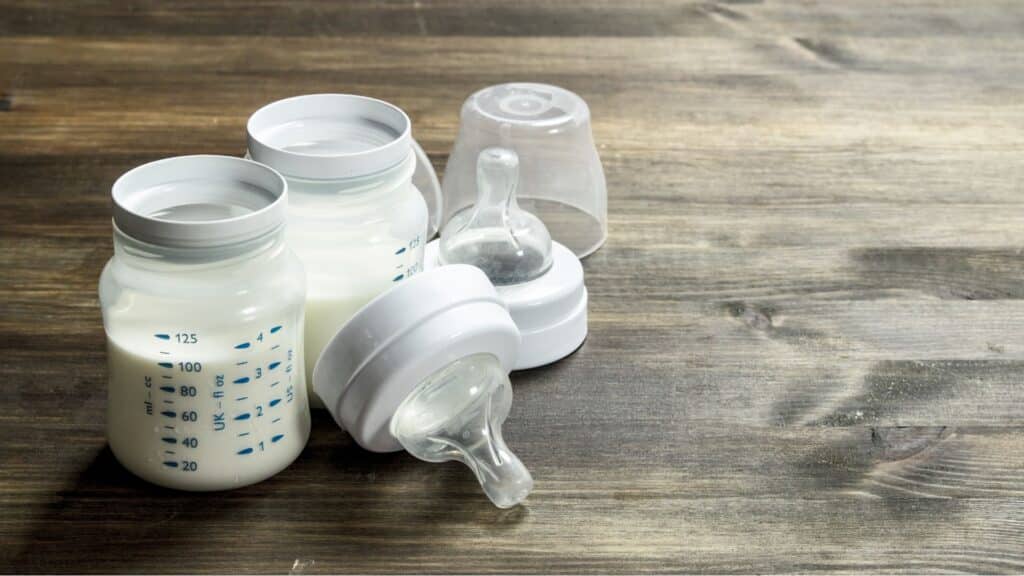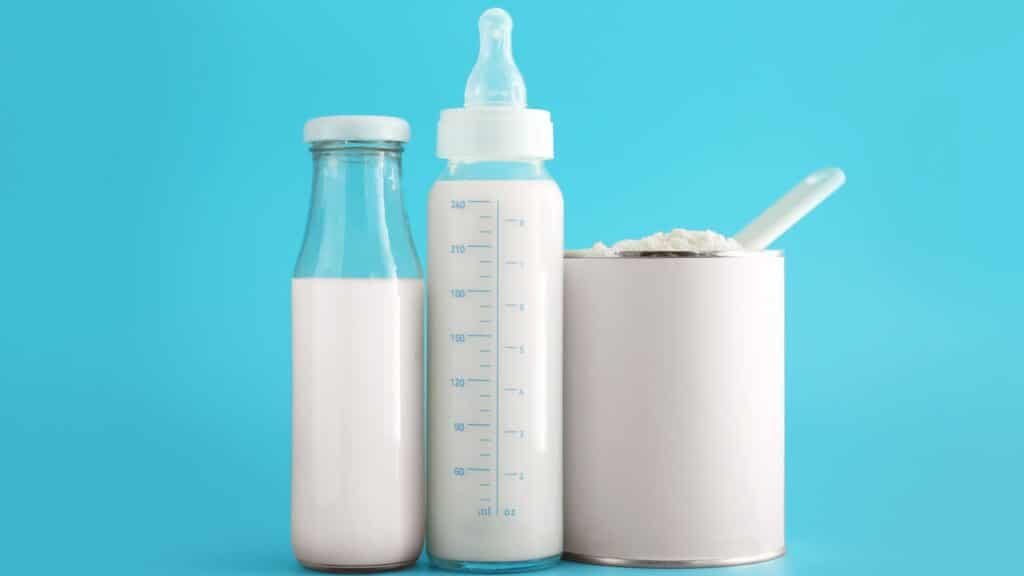Parents and caregivers across the country are still grasping at straws as the baby formula shortage is still prevalent on grocery shelves in several places in the United States. The scarcity of baby formula has affected many families, with retailers limiting their sales to somehow make the supplies last. But where did the issue stem, and how did it happen?
This article will take a deep dive into the importance of baby formula, why there is baby formula storage, and so much more. So, if you want to discover more about the infant formula industry, continue reading.

In-depth Understanding Of Baby Formula
Manufacturers design infant formulas to mimic human milk, ensuring babies get the nutrients they need for growth. These products target babies over 1 year old and serve as an alternative to breastfeeding in special supplemental nutrition programs.
There are many reasons why a new parent or caregiver might prefer baby formula over breast milk. Although the World Health Organization (WHO) highly advises parents to exclusively breastfeed their child during the first 6 months and up to two years and beyond, many new parents have challenges producing sufficient breast milk for their babies [1].
Some also don’t have enough support to breastfeed their infants. Also, some infants require a unique supplemental nutrition program to address particular metabolic illnesses.
The World Health Organization also says that children and adolescents who received breast milk as babies are less prone to obesity or being overweight. They also tend to perform better on cognitive tests and are less likely to get sick.
However, there are times when parents find it challenging to give breast milk to their babies. Apart from their hectic lifestyle, health-related concerns can be a factor as to why parents have problems breastfeeding their babies.
Primary Nutrients Found in Infant Formula
Most infant formula products today came from cow’s milk. They include extra nutrients to closely resemble breast milk, providing babies with essential growth and health nutrients.
Most infant formula products made with cow’s milk contain the following:
- Carbohydrates
- Protein
- Iron
- Supplementary minerals such as calcium and zinc
- Vitamins, including A and D, as well as B vitamins.
Meanwhile, baby formulas contain particular nutrients meant to be a part of a special supplemental nutrition program. These baby formulas often contain ARA and DHA fatty acids, which are essential to a baby’s vision and brain function.
Mothers can add these essential fatty acids to their diet to enrich their breast milk. Other nutrients in these baby formulas include nucleotides, prebiotics, and probiotics.

Understanding the Primary Types of Infant Formula
The Food and Drug Administration (FDA) regulates various commercially available products, including commercial infant formula products. Let’s take a closer look at the primary types available:
Cow’s Milk Protein-based Infant Formula
Manufacturers modify cow’s milk to match the composition of breast milk for most infant formulas. Doing so ensures that the formula has the right amount of nutrients and makes it easier to digest. Most babies do well on formula made from cow’s milk. But some babies, like those allergic to the proteins in cow’s milk, need different infant formulas.
Soy-based Baby Formula
Soy milk can be an essential part of an infant’s diet, especially for parents and caregivers who want to exclude animal protein from their baby’s diet. Soy milk baby formula is also an excellent choice for babies allergic to cow’s milk baby formula or lactose, a naturally occurring carbohydrate in cow’s milk.
Protein Hydrolysate Baby Formula
These baby formula products contain broken-down (hydrolyzed) animal proteins that are either partially or extensively granulated to ensure they can easily get mixed with water. This formula is ideal for babies who are allergic to soy milk or cow’s milk. Meanwhile, extensively hydrolyzed baby formula suits babies who have a protein allergy.
Specialized Baby Formula
Specialized baby formula products are also produced for premature babies and infants with specific medical conditions. But with all the options available, what caused the national baby formula shortage affecting the entire country?
Primary Factors that Caused the Baby Formula Shortage
The previous U.S. baby formula crisis occurred during World War II when tin was diverted from baby formula cans to military equipment. Rationing and black market purchases hit disadvantaged Americans the most. Many infants went without meals. Now, the infant formula crisis is happening again but for a completely different set of reasons.
- Pandemic: During the start of the pandemic, many families were stockpiling various supplies, including baby formula. Thus, causing a spike in its demand. Although the demand fell shortly after, the baby formula supply never returned to the way it was. Many families used what they already had instead of buying one. This even caused the formula market to produce fewer products than anticipated.
- Delays: The pandemic also caused major supply chain issues, simultaneously disrupting formula production. Natural calamities also contributed to the delay, noting the halt in baby formula production at Abbott’s Michigan plant [2].
- Disease Control: Earlier in 2022, Abbott’s Michigan plant was also found to have had bacterial contamination, which may have resulted in the deaths of two babies and hospitalized four. Because of it, the Food and Drug Administration had to recall three of its most popular powdered formula products. The company also had to shut down the Abbott plant because of the FDA regulation. In the same year, Abbott, one of the country’s giant formula manufacturers, also had to recall their ready-to-feed formulas upon FDA investigation because of damaged bottle seals, which may possibly cause contamination and spoilage.

Understanding the Effects of the Infant Formula Shortage
Parents across the country are alarmed by the alarming baby formula shortage. One in four US infants is exclusively breastfed for the first six months. Because of it, the infant formula crisis resulted in adverse impacts on parents’ overall well-being.
Studies showed that the shortage adversely affected mothers’ emotional and mental health. They’ve also reported financial and intangible costs caused by infant formula shortages. But the impactful adverse effect that the crisis caused is the drastic change in infant feed practices, primarily the use of homemade formula, which could have detrimental effects on an infant’s health.
Baby formulas play a crucial role in a baby’s growth. Lack of access to specialty formulas could cause children to experience short and long-term health complications, including dehydration and developmental delays.
Meanwhile, diluting or using unregulated homemade formulas that didn’t go through FDA nutritional guidelines could also be unsafe for babies, causing severe health problems such as slow growth and seizures. The crisis in the formula market has primarily affected low-income families across the country.
What You Need to Know About Homemade Baby Formula
It’s only normal for parents and caregivers alike to do everything they can for their babies amidst the formula shortage. That’s why many people consider whether homemade infant formula is an ideal alternative for their babies.
However, most people may not be aware of it, but homemade baby formula can potentially be dangerous for babies. Even worse, improper formula use can cause babies to develop serious health problems in the future.
Unlike formula manufacturers, these homemade products didn’t go through the FDA regulation, making them unsafe for consumption. Also, your baby might experience a series of nutritional imbalances, which might cause them to miss out on a few essential nutrients they need for growth.
How the Biden Administration Addresses the Situation
To alleviate the US infant formula deficit, the Biden administration issued a memorandum on May 18 delegating Defense Production Act priority and allocations to the Secretary of Health and Human Services. The Defense Production Act ensures a healthy market share supply of formula to low-income women, infants, and children across the country. And as the supply chains slowly increase supply, the White House will look into addressing the severe shortages that are happening across the country.
The first priority market consolidation ensures that Abbott Nutrition can get the raw materials, like corn syrup and sugar, to make baby formula at full capacity. Doing so guarantees that Abbott Nutrition can acquire all the necessary materials to produce formula domestically at full capacity.
The second market consolidation guarantees that Reckitt, a consumer products company associated with infant formula manufacturing, gains access to single-use products needed for production. To ensure that the company acquires sing-use products, the Government Procurement Law ensures that the company can acquire the products from the suppliers over the next three months from when the law has been enacted [3].
Also, under Operation Fly Formula, the USDA (U.S. Department of Agriculture), HHS (Department of Health and Human Services), and GSA (General Services Administration) has partnered with other retail stores as the European formulas meet with the US federal agencies to import more formulas and address the weakening market shares in the country. It’s a practical way to get more formula back into the shelves faster [4].

Why It’s Safer to Use Infant Formulas
The out-of-stock rates may have gotten through the roof, especially for low-income families. However, finding formula products that adhere to FDA standards is still essential.
Remember that commercial baby formula is an ideal way to provide your child with the nourishment that they need, especially if breastfeeding isn’t an option. The FDA requires every baby formula manufacturing company to adhere to the minimum set requirements to ensure there won’t be any viral or bacterial infection cases amidst the national shortage.
Online formula recipes may seem like an ideal way to personally address the shortage as the Biden administration is still trying to resolve the current market concentration. However, meeting your baby’s needed nutrition at home may be challenging. Here are a few reasons why commercial formula products are still a better choice.
Potential Infection and Contamination
Preparing baby formula at home increases the risk of contamination. Remember that formulas that use unpasteurized raw cow’s milk or goat’s milk may lead to various infections, such as Salmonella.
Nutritional Imbalances
It’ll take work to determine if your homemade formula recipe has the right amount of essential nutrients to nourish your child. For instance, plant-based milk formulas won’t provide enough calcium for your child’s needs. Thus, leading to potential problems such as irritability.
Potential Excess in Nutrients
Since homemade baby formula products aren’t FDA regulated, there are chances that they may contain too many nutrients. Although it’s a case-by-case basis, there may be instances when it may contain too much salt or protein, which can be difficult for your baby’s body to break down.
What Should You Do Amidst The National Shortage?
Whether biological or adoptive parents, every parent’s instinct is to ensure their baby has enough nutrition for their needs. Ever since the pandemic has significantly affected the production of formula makers nationwide, it’s up to you to try your best to adapt and meet your child’s needs. Here are a few tips to help you adapt to the shortage until it’s resolved.
Find Formula Online
If you can afford it, it’s best to buy formula online until the market share returns to normal. You consider purchasing from highly recognized store brands and grocers and see if they have anything sold.
Check Your Social Media Groups
You may also consider joining other groups and see if there are any updates about the available formula products. Other parents and caregivers make various groups to let others know if products are available from well-recognized formula makers. Also, be on the lookout for FDA-approved imported products online. There are many European formulas made with whole cow’s milk which might be an excellent alternative to your baby’s infant formula.
Consider Switching
Most babies are entirely okay with switching to any formula, including other store brands. So, it’s highly possible that giving cow’s milk formula to your baby will be fine as long as they’re the same type.
Be Patient
Lastly, be patient. Getting your baby used to the new formula may take more than a few weeks. So, while the White House is still addressing the issue, it’s essential to stay as patient as possible. You may try asking your pediatrician if your baby is adapting to the new formula.

Conclusion
This is a stressful time for everyone– especially women, infants, and children. So, don’t hesitate to ask help from your baby’s doctor for the best and safest way to feed baby formula during the crisis.
Thanks for reading my article. Please feel free to comment below if you have any questions, or share this with a friend who might be interested.



